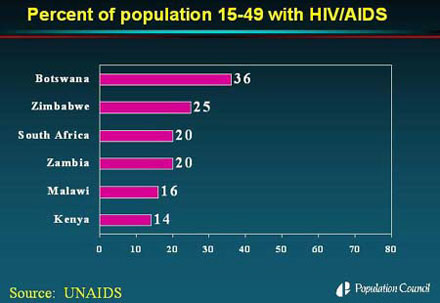U.S. Foreign Policy and Global Health: Addressing Issues of Humanitarian Aid and Political Instability
Overview
Featuring Dr. Jordan Kassalow, Senior Fellow, Council on Foreign Relations,
Dr. Andrew Fisher, Director, HIV/AIDS Operations Research Project, Population Council;
Dr. Alfred V. Bartlett, Senior Advisor for Child Survival, U.S. Agency for International Development; and Senior U.S. Adviser, UN Special Session on Children,
Geoffrey D. Dabelko, Director, Environmental Change and Security Project (co-chair); and
Steven Durand, Senior Program Officer, Population Resource Center (co-chair)
Co-sponsored by the Population Resource Center, the Environmental Change and Security Project, and the Conflict Prevention Project
November 16 , 2001—In the wake of recent anxiety about anthrax and other forms of bioterrorism, domestic and global public health have reemerged as issues both for U.S. national security planning and for its foreign policy formulation. At a meeting cosponsored by the Population Resource Center, the Environmental Change and Security Project, and the Conflict Prevention Project, three public health experts made the case for the United States to take global leadership on general health issues as well as the specific problems of HIV/AIDS and children's health.
A Matter of Self-Interest
Calling global health "a matter of intense self-interest" for America, Dr. Jordan Kassalow, an adjunct senior fellow at the Council on Foreign Relations, outlined three reasons why health should be more prominent on the U.S. foreign policy agenda: (1) Americans face a clear and present danger from infectious diseases as well as from man-made bioterror; (2) global health issues and risks undermine U.S. economic and security interests abroad; and (3) the United States has a unique opportunity to lead the world toward a healthier state.
 The resurgence of old and the emergence of 30 new infectious diseases over the last two decades, Kassalow said, has combined with globalized trade and travel and an unprecedented rise in antibiotic-resistant infections to threaten the globe with deadly and widespread pandemics. This nexus is most clearly represented by the prospect of bioterrorism, for which Kassalow said the United States is quite ill-prepared in every respect.
The resurgence of old and the emergence of 30 new infectious diseases over the last two decades, Kassalow said, has combined with globalized trade and travel and an unprecedented rise in antibiotic-resistant infections to threaten the globe with deadly and widespread pandemics. This nexus is most clearly represented by the prospect of bioterrorism, for which Kassalow said the United States is quite ill-prepared in every respect.
Kassalow went on to argue that poor health internationally (a) stunts economic growth in myriad ways, (b) creates political instability, and (c) decreases military preparedness and peacemaking capabilities around the globe—all factors that undermine U.S. interests. For example, Kassalow said, if malaria had been eradicated years ago, Africa's GDP in 2000 would have been $100 billion larger in 2000-five times the total foreign direct assistance that the continent received that year. Infant mortality is also recognized as highly correlated with state failure and declining social cohesion. And while medical resources are often a primary target of modern warfare, Kassalow said that military and peacekeeping readiness has also been affected (particularly in sub-Saharan Africa) by rising HIV infection rates in military personnel.
A "Unique Leadership Opportunity"
Kassalow called health a "unique leadership opportunity" for the United States, and he detailed five key areas for expanded activity:
* approaching health as a global public good and linking it with health and poverty reduction;
* linking health to human rights;
* funding and facilitating accelerated research and development on orphan drugs and vaccines as well as universal access to these products;
* tying debt relief to health through measurable objectives in health system development; and
* replicating and expanding on those public/private health partnerships already in place.
Among Kassalow's specific recommendations were: an increase in U.S. global health spending by at least $1 billion annually; funding of USAID for HIV/AIDS treatment and prevention in India, China, and Russia; and the endorsement of the President and Secretary of State for global health's priority in U.S. foreign policy. "American foreign policy works best when it combines high moral ideals with real-world interests," said Kassalow. "Like the Marshall Plan, a foreign policy that seriously invests in global health would be a high point in the ethical life of this country and a wonderful example of service to mankind as an investment in our future." 
African States heavily afflicted with HIV/AIDS
The Devastation and Continuing Threat of HIV/AIDS
Dr. Andrew Fisher of the Population Council next focused on the monumental consequences of HIV/AIDS for global public health and well-being. "My take-home message," said Fisher, "is that this is an epidemic that continues to rage on, and it's not stopping. . .Even if we had a vaccine tomorrow, the consequences of AIDS would go on for generations."
Fisher detailed a list of staggering statistics about the epidemic: 22 million dead through 1999; 36 million living with HIV/AIDS; 5.4 million newly infected each year; and an estimated 44 million to be orphaned by 2020, most of them living in Africa. Indeed, Africa remains the epicenter of HIV/AIDS, with three-quarters of all people living with AIDS. HIV has infected more than 20 percent of many sub-Saharan African country populations, and in some communities infection rates are as high as 70 percent.
While India and China currently have relatively low prevalence rates of the disease, they can only stop an epidemic "by throwing everything they have at it right now," said Fisher. "If their prevalence levels rise to anywhere near the levels seen in Eastern and Southern Africa," he said, "the consequences would be almost overwhelming."
 HIV/AIDS has devastating effects on both individuals and society, said Fisher: patients' suffering and stigmatization; the burden of those newly orphaned; and shocking declines in national agricultural, industrial productivity, and life expectancy. "We see life expectancy declining throughout Southern Africa," Fisher noted, "to levels of the late 1950s." The epidemic has also stressed to the breaking point health care and educational systems in the hardest-hit countries. Half of all hospital beds in some areas are now filled with AIDS patients, said Fisher, and in Mozambique, more teachers die of AIDS than are replaced on an annual basis.
HIV/AIDS has devastating effects on both individuals and society, said Fisher: patients' suffering and stigmatization; the burden of those newly orphaned; and shocking declines in national agricultural, industrial productivity, and life expectancy. "We see life expectancy declining throughout Southern Africa," Fisher noted, "to levels of the late 1950s." The epidemic has also stressed to the breaking point health care and educational systems in the hardest-hit countries. Half of all hospital beds in some areas are now filled with AIDS patients, said Fisher, and in Mozambique, more teachers die of AIDS than are replaced on an annual basis.
Fisher said effective solutions to the epidemic require multiple perspectives. Consideration of human rights is critical, he argued, because AIDS glaringly exposes the tears in society's fabric—everything from intolerance of racial, religious, and sexual minorities to the vulnerability of young and impoverished women. Prevention, care, support, and treatment are obviously also crucial and provide opportunities at each step for the message of prevention.
But perhaps the most important factor in fighting AIDS, said Fisher, is to mobilize a series of very different communities in the battle. The Population Council has worked groups as disparate as Thai business executives (towards non-discriminatory work environments) as well as commercial sex workers in Brazil and Calcutta (to build their sense of community and solidarity in the support of widespread condom use). Fisher also stressed the need to scale up programs, to strengthen health care systems, to support new initiatives in other sectors being impacted by the epidemic, and to accelerate the drive for an HIV microbicide and vaccine.
Global Children's Health and Poverty
Dr. Andrew Bartlett of USAID then reviewed the state of children's health globally and the links between that improving but still unsatisfactory condition and global security. The major causes of mortality for children under five (such as respiratory infections, diarrheal diseases, malaria, and vaccine-preventable diseases) are far more easily dealt with by the U.S. health care system than they are in developing countries. But the United States, Bartlett argued, has an enlightened self-interest in helping to address these problems internationally.
A substantial part of the existing global disease burden falls on children under five, and there are proven links between widespread childhood diseases and (a) increased poverty as well as (b) a demographic transition to a low mortality/low fertility pattern, which can retard a society's economic growth. While inexpensive interventions (such as immunization and micronutrients) have vastly improved children's health, Bartlett said, there is still a tremendous unmet need. For example, a quarter of children worldwide is still not immunized, and over 40 percent go untreated for pneumonia.
Bartlett cited a World Bank study that showed a direct proportional relationship between household wealth and children's health, and said that this disparity between rich and poor was "an important social and political force that needs to be reckoned with." While the United States is a leading financial and technical donor for children's health programs, Bartlett argued that this leadership needs to be taken up and expanded. Disseminating new vaccines against the major childhood diseases, he said, is one step that could immediately save over half of the 10.5 million children who die each year.
Human Right Versus Safety Net
Discussion focused on why health continues to languish as an international priority for the United States even as events repeatedly stress its centrality to global problems. Bartlett said that the United States is nervous about legalizing good health as a human right because "for every right there is a duty-bearer"—a statist approach that conflicts with the U.S. refusal to recognize government's obligation beyond that of a safety net. Kassalow cited recent Congressional appropriation of $3.5 billion to fight bioterrorism "on the basis of four people dying" as an example of how the United States acts most decisively when its narrow self-interest is threatened.
Finally, responding to audience questions about his own emphasis on health as an issue of national self-interest, Kassalow said that a purely humanitarian rationale for improving global health has repeatedly failed to gain the attention of U.S. policymakers. "We need to bolster the evident humanitarian need with arguments of self-interest in order to extract the political will necessary to address these huge global health problems," Kassalow concluded.
Hosted By

Environmental Change and Security Program
The Environmental Change and Security Program (ECSP) explores the connections between environmental change, health, and population dynamics and their links to conflict, human insecurity, and foreign policy. Read more
Thank you for your interest in this event. Please send any feedback or questions to our Events staff.








